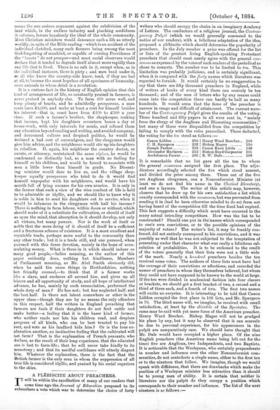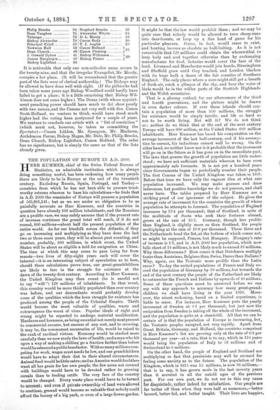A PLtBISCITE ABOUT PREACHERS.
IT will be within the recollection of many a our readers that some time ago the Journal of Education proposed to its subscribers a vote which was to determine the choice of forty writers who should occupy the chairs in an imaginary Academy of Letters. The conductors of a religious journal, the Contem- porary Pulpit (which we would generally commend to the notice of our readers), with a felicitous adaptation of the idea, proposed a plebiscite which should determine the popularity of preachers. In the July number a prize was offered for the list or lists of the greatest living English-speaking Protestant preacheis that should most nearly agree with the general con- sensus as expressed by the votes of such readers of the periodical as chose to compete. The number was to be limited to ten. This limitation was probably judicious, and is certainly significant, when it is compared with the forty names which literature was expected to furnish. It would certainly be no exaggeration to say that there are fifty thousand preachers in England, while of writers of books of every kind there can scarcely be ten thousand ; and of the men of letters who by any means could come into the competition there can hardly be half as many hundreds. It would seem that the fame of the preacher is narrow in range and difficult of attainment. The current num- ber of the Contemporary Pulpit gives the results of the voting. Three hundred and fifty papers in all were sent in, "mainly from the clergy of the Anglican and Dissenting communities ;" but many of these were disqualified from the competition by
failing to comply with the rules prescribed. These deducted, the voting for the ten stood as follows :—
Canon Liddon
296 Henry Ward Beecher.. 168 C. H. Spurgeon 292 Bishop Magee ...... 150 Joseph Parker 218 Canon Knox Little ... 149 Alexander Maclaren 212 Bishop Boyd Carpenter 101 Archdeacon Farrar 206 R. W. Dale 100
It is remarkable that no list gave all the ten to whom the general consensus assigned the first place. The adju- dicators accordingly selected the five which stood nearest, and divided the prize among them. Three out of the five are Anglican clergymen, one a Nonconformist Minister (at least we do not find his name in the Clerical Directory), and one a layman. The writer of this article may, however, observe that he drew up for his own satisfaction a list which exactly corresponded with the consensus, but was prevented from sending it in (had he been otherwise minded to do so) from not having heard of the competition till the time fixed had expired. This fact suggests a difficulty which must have occurred to the many actual intending competitors. How was the list to be constructed ? Should one put in the:names which corresponded to one's own convictions, or to the possible opinions of the majority of voters ? The writer's list, it may be frankly con- fessed, did not entirely correspond to his convictions, and it was possibly as well that he was not subjected to the temptation of presenting under that character what was really a felicitous cal- culation of probabilities. It is to be reckoned to the credit of the voters generally that their lists were not a little wide of the mark. Nearly a hundred preachers besides the ten received some votes. The authors of these lists must have had the courage of their convictions or affections, and recorded the names of preachers in whom they themselves believed, but whom they could not have supposed to be known to the world at large. If the ten were divided in academical fashion into four classes or brackets, we should get a first bracket of two, a second and a third of three each, and a fourth of two. The first two names will excite no surprise. It is interesting to be told that Canon Liddon occupied the first place in 108 lists, and Mr. Spurgeon in 76. The third name will, we imagine, be received with small satisfaction, at least by the clientele of the Spectator. The same may be said with yet more force of the American preacher, Henry Ward Beecher. Bishop Magee will not be grudged his place by any, but it may be observed that it can scarcely be due to personal experience, for his appearances in the pulpit are comparatively rare. We should have thought that Mr. Dale would have occupied a higher place. Of the nine English preachers (the American name being left out for the time) five are Anglican, two Independents, and two Baptists. It is noticeable that the Wesleyans, who certainly preponderate in number and influence over the other Nonconformist com- munities, do not contribute a single name, either to the first ten or to the nineteen that follow. We imagine, though we would speak with diffidence, that there are drawbacks which make the position of a Wesleyan minister less attractive than it should be to young men of ability. It is certain that neither in literature nor the pulpit do they occupy a position which corresponds to their number and influence. The list of the next nineteen is as follows :—
Philip Brooks Dean Vaughan Talmage Bishop Alexander Principal Caird Newman Hall Dean Church J. Oswald Dykes James Macgregor Bishop Lightfoot 94 75 72 70 69 52 48 ... 41 40 38 Stopford Brooke Alexander Whyte D. L. Moody Canon Body T. J. Angler Canon Holland 1 Canon Fleming ) Bishop Wilkinson 1 Bishop Fraser ) 35 34 33 30 29 21 20
It is noticeable that only one non-orthodox name occurs in the twenty-nine, and that the irregular Evangelist, Mr. Moody, occupies a low place. (It will be remembered that the greater part of the lists were of clerical authorship.) The Bishops may be allowed to have done well with eight. (If the pldbiscite had been taken some years ago Bishop Woodford could hardly have failed to get a place ; it is a little surprising that Bishop Wil- kinson does not come higher.) The Deans (with whose appoint- ment preaching power should have much to do) show poorly with two names, and the Canons not very well with five. Canon Scott-Holland, we venture to think, would have stood much higher had the voting been postponed for a couple of years. We venture to conclude our article with a "list of conviction" (which must not, however, be taken as committing the Spectator)s—Canon Liddon, Mr. Spurgeon, Mr. Maclaren, Archdeacon _Farrar, Bishop Magee, Mr. Dale, Mr. Philip Brooks, Dean Church, Bishop Lightfoot, Canon Holland. The order has no significance, but is simply the same as that of the lists already given.















































 Previous page
Previous page